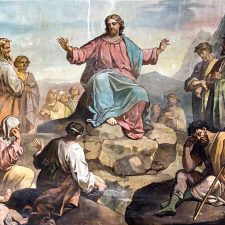In Matthew 3:1-2, we are told that the ministry of John the Baptist is best characterized in his statement, “Repent, for the kingdom of heaven is at hand.” Once he was put into prison, Jesus picked up John’s mantle, signifying the beginning of His public ministry as Matthew gives the following testimony:
Now when Jesus heard that John had been taken into custody, He withdrew into Galilee; and leaving Nazareth, He came and settled in Capernaum, which is by the sea, in the region of Zebulun and Naphtali. This was to fulfill what was spoken through Isaiah the prophet: “THE LAND OF ZEBULUN AND THE LAND OF NAPHTALI, BY THE WAY OF THE SEA, BEYOND THE JORDAN, GALILEE OF THE GENTILES— “THE PEOPLE WHO WERE SITTING IN DARKNESS SAW A GREAT LIGHT, AND THOSE WHO WERE SITTING IN THE LAND AND SHADOW OF DEATH, UPON THEM A LIGHT DAWNED.” From that time Jesus began to preach and say, “Repent, for the kingdom of heaven is at hand.” (Matthew 4:12-17)
The Greek word for repent is metanoeoe and it is the combination of two words, meta denoting a change of place or condition and noeoe which means to exercise the mind, to think, or comprehend. It basically refers to regret or sorrow accompanied by a true change of heart. Regret can mean sorrow because you got caught, but repentance moves forward to a restored relationship. Some theologians identify this distinction as between “attrition”, remorse caused by fear of punishment or a loss of blessing, and “contrition”, genuine repentance. Contrition includes deep remorse for having offended God. King David spoke of this in Psalm 51:10 and 17: Create in me a clean heart and renew a steadfast spirit within me… The sacrifices of God are a broken spirit. A broken and contrite heart – these, O God, You will not despise.
Genuine Repentance
The quote Jesus made in Matthew 4 is from Isaiah 9:1-2 and identifies THE LAND OF ZEBULUN AND THE LAND OF NAPHTALI, referencing the very land of not only Jesus’s childhood but also about 2/3 of His public ministry. The light that would shine from Jesus’s ministry would represent a total change of mind and direction from the teaching of the Pharisees and Sadducees. Paul illustrates what genuine repentance looks like in his second letter to the Corinthians:
For though I caused you sorrow by my letter, I do not regret it; though I did regret it—for I see that that letter caused you sorrow, though only for a while— I now rejoice, not that you were made sorrowful, but that you were made sorrowful to the point of repentance; for you were made sorrowful according to the will of God so that you might not suffer loss in anything through us. For the sorrow that is according to the will of God produces repentance without regret, leading to salvation, but the sorrow of the world produces death. For behold what earnestness this very thing, this godly sorrow, has produced in you: what vindication of yourselves, what indignation, what fear, what longing, what zeal, what avenging of wrong! In everything you demonstrated yourselves to be innocent in the matter. (2 Corinthians 7:8-11)
Billy Graham and other evangelical leaders many years ago started using the sinner’s prayer as an avenue to deliver the Gospel to the world and lead unbelievers into a saving grace. It begins with an acknowledgment to God of the sinful condition each person faces and the need for forgiveness. The potential believer then commits to turning from personal sins to invite Jesus into his heart and life.
Dear Lord Jesus, I know that I am a sinner, and I ask for Your forgiveness. I believe You died for my sins and rose from the dead. I turn from my sins and invite You to come into my heart and life. I want to trust and follow You as my Lord and Savior. In Your Name. Amen. ~ Billy Graham
Salvation by Grace, Through Faith
Other evangelical programs like the Four Spiritual Laws promoted by Bill Bright and Campus Crusade for Christ or the Romans Road to Salvation emphasize a recognition that all have sinned and fall short of the glory of God (Romans 3:23). This premise is the foundation for the need for repentance. However, is repentance a requirement for salvation? Several passages dealing with salvation do not mention repentance as a must, including Ephesians 2:8-9: For by grace, you have been saved through faith; and that not of yourselves, it is the gift of God; not as a result of works, so that no one may boast. The environment for salvation is grace, that it is God’s work alone, and it must be by faith and given as a free gift. The Philippian jailor (Acts 16:30-31) asked what he needed to do to be saved and Paul’s answer was to believe in the Lord Jesus Christ and you will be saved. In John 4:10, Jesus introduced salvation, eternal life to a Samaritan woman with two requirements, to know (eido – perceive) the gift of God (i.e., salvation) and who it is who says to you, “Give Me a drink.” Repentance is not included. To receive eternal life, she needed only to recognize the Giver and that He had a free gift to give.
The Reformation Study Bible, R.C. Sproul General Editor, on page 2059 has an article dealing with and entitled Repentance. In it, the writer’s take is that repentance is the result of regeneration and not the cause:
Repentance is not the cause of new birth or regeneration; it is the fruit of regeneration. Though repentance begins with regeneration, it is an attitude and action that must be repeated throughout the Christian life. As we continue to sin, we are called upon to repent as we are convicted of our sin by the Holy Spirit.
Repentance Implied
Many evangelical Christians might say that although not outwardly stated, repentance is implied as necessary for anyone to become a Christian. When Saul of Tarsus received Christ and His commission to be the Apostle to the Gentiles in Acts 9:4-6, there was no mention of repentance. Paul’s testimony in 1 Timothy1:16 is, for this reason I found mercy, so that in me as the foremost [sinner], Jesus Christ might demonstrate His perfect patience as an example for those who would believe in Him for eternal life. He was saying that his salvation required his recognition as being a sinner and that he needed mercy, an implication of repentance. His salvation as an enemy of Jesus Christ became an example to many of the transforming power of being born from above. The greatness of salvation is exemplified in the supernatural ability of God to change lives.
Some passages suggest that repentance is a necessity for salvation, including Acts 2:37-38, Now when they heard this, they were pierced to the heart, and said to Peter and the rest of the apostles, “Brethren, what shall we do?” Peter said to them, “Repent, and each of you be baptized in the name of Jesus Christ for the forgiveness of your sins; and you will receive the gift of the Holy Spirit. The rich man in Luke 16:27-31 pleaded with Abraham to send someone to his five brothers and warn them, then they would repent. But he said to him, “If they do not listen to Moses and the Prophets, they will not be persuaded even if someone rises from the dead.” Being a child of Abraham would not be enough to qualify. As the passage below confirms, there must be good fruit and good fruit comes after the roots of the tree (i.e., old covenant) are cut down. True repentance is all about leaving behind the old ways.
Step of Faith Based on Reason
So, he began saying to the crowds who were going out to be baptized by him, “You brood of vipers, who warned you to flee from the wrath to come? Therefore, bear fruits in keeping with repentance, and do not begin to say to yourselves, ‘We have Abraham for our father,’ for I say to you that from these stones God is able to raise up children to Abraham. Indeed, the axe is already laid at the root of the trees; so, every tree that does not bear good fruit is cut down and thrown into the fire.” (Luke 3:7-9)
Jesus says in Matthew 9:13, I did not come to call the righteous, but sinners. Repentance begins when a person comes to his senses to understand that his current condition (a sinner) has been a snare (2 Timothy 2:25-26) and is keeping him from realizing the quality-of-life God has prepared for him. This realization means he is now willing to move on from the allegiances and alliances that have defined his condition. A religious man must be willing to turn away from the religious system that keeps him in bondage. This is where faith begins, and it is a step of faith based on reason and not a blind leap, as Francis Schaeffer taught. It is a willingness to trust in some promises made by an unknown or little-known entity that stepping away from the current environment will not result in death. It is based on the hope of a new and meaningful life.
Or do you think lightly of [kataphroneo–take lightly, despise] the riches of His kindness and tolerance and patience, not knowing that the kindness of God leads you to repentance? But because of your stubbornness and unrepentant heart you are storing up wrath for yourself in the day of wrath and revelation of the righteous judgment of God. (Romans 2:4-5)
The above passage tells us that it is the kindness of God that leads one to repentance. Paul is addressing the religious Hebrew who is stubbornly holding on to his own conventions despite the manifestations of God’s grace happening all around him. It represents a journey from taking God’s kindness for granted to accepting and receiving it personally. Paul understood that his call was to solemnly testify to both Jews and Greeks of repentance toward God and faith in our Lord Jesus Christ (Acts 20:21).
Unloading Burdens
True repentance is the process of unloading burdens. Blessed be the Lord, who daily bears our burden, the God who is our salvation. Selah(Psalm 68:19). Through the prophet Ezekiel, the Lord tried to warn the people by having the prophet carry baggage on his shoulder like the baggage of an exile (Ezekiel 12:6-7). Unloading the baggage of one’s sin on another is to share his burden. Take My yoke upon you and learn from Me, for I am gentle and humble in heart, and YOU WILL FIND REST FOR YOUR SOULS. For My yoke is easy and My burden is light (Matthew 11:29-30).” When one is yoked up to Christ, he finds rest. Observe the following:
There is a Jewish tale about a merchant named Yankel who carried his wares from town to town. One day, as a horse-drawn wagon passed by Yankel, the owner recognized him and offered him a ride. Yankel gratefully accepted the offer, but a few moments later, the wagon owner noticed that Yankel was still carrying his burden on his shoulders. “Yankel,” he said, “why don’t you put your bags down?” “Oh, it’s all right,” Yankel replied. “I don’t want to be any trouble.” “Yankel, you fool!” the owner exclaimed. “My horses are pulling everything in the wagon whether or not you are carrying them. Put down your bags and stop carrying all this unnecessary baggage!”
Repentance After Regeneration
The greatest work of repentance is accomplished after regeneration. It is turning back to God, unloading the burden of sins on the One who wishes to bear it. In Isaiah 30:15, For thus the Lord God, the Holy One of Israel, has said, “In repentance [subah – turning back to God] and rest you will be saved [delivered], in quietness and trust is your strength.” But you were not willing. Repentance is a willingness to turn back to God who has already proven that His love is complete. It happens when the believer gets a taste of the sweetness of his relationship with Jesus Christ and that it is worth his devotion.













